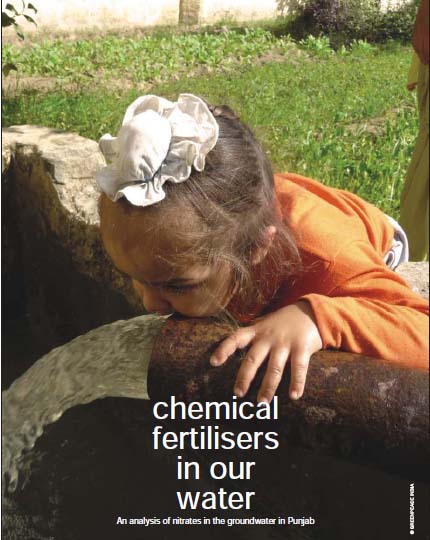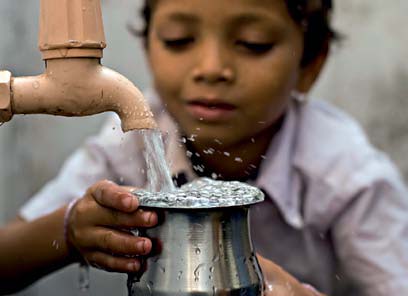/topics/rural-water
Rural Water
Encephalitis deaths in India - The same story of poverty, neglect, disaster and disease, how long will this continue ?
Posted on 02 Dec, 2011 10:15 AMGuest post by : Aarti Kelkar-Khambete
Politicians for reform - Proceedings of the State Water Ministers’ workshop on rural water supply policy reforms in India - Cochin (Kerala) - (1999)
Posted on 22 Nov, 2011 10:01 AMThe workshop was hosted by Government of Kerala and the Water and Sanitation Program, South Asia with the Government of India, The World Bank Institute and the World Bank was held at Cochin, Kerala from December 7th to December 8th, 1999.
Workshop on rainwater harvesting in Meerut’ - Janhit Foundation's e-newsletter of March 2011
Posted on 11 Nov, 2011 09:29 PMContent courtesy: Janhit Foundation
Northeast monsoon arrives in Tamil Nadu, Kerala, Lakshadweep and coastal Andhra Pradesh, snowfall in Himachal and Kashmir - News Roundup (15 to 31 October 2011)
Posted on 06 Nov, 2011 04:59 PMThe monsoon has become active in the states of Tamil Nadu, Kerala, Lakshadweep and parts of coastal Andhra Pradesh. There are also reports of heavy rainfall in parts of Karnataka. At the same time, news from the north in the states of Himachal Pradesh and Kashmir includes reports of a cold wave and rains and the first snowfall of the season.
Northeast monsoon
Efficacy, effectiveness and acceptability of closed containers, Moringa oleifera and in-home chlorination - A paper from AJTMH
Posted on 04 Nov, 2011 12:38 PMThis study published in the journal The American Journal of Tropical Medicine and Hygiene (AJTMH) aimed at assessing water contamination and the relative effectiveness of three options for point-of-use water treatment in South India.
Advancing development - Towards sustainable livelihoods - Madurai Symposium - DHAN Foundation - September 14-18 ( 2011)
Posted on 04 Nov, 2011 08:47 AMThe Madurai Symposium organised by the
Chemical fertilizers in our water - An analysis of nitrates in the groundwater in Punjab by Greenpeace
Posted on 31 Oct, 2011 09:00 AM The level of nitrate in drinking water was tested from groundwater artesian wells located within farms and surrounded by crops (mostly rice and wheat rotations).
The level of nitrate in drinking water was tested from groundwater artesian wells located within farms and surrounded by crops (mostly rice and wheat rotations).
Nitrate pollution in groundwater is associated with nitrogen loads in the environment. In urban areas, it is associated with sewage and in agriculture areas, with livestock sources and nitrogen fertiliser inputs. Nitrate pollution in drinking water can have serious health impact on humans, especially for babies and children. The most significant potential health effects of drinking water contaminated with nitrate are the blue-baby syndrome (methemoglobinemia) and cancer.
New hope for Indian food security? The System of Rice Intensification – A paper by International Institute for Environment and Development
Posted on 29 Oct, 2011 11:43 AMThis paper from the gatekeeper series of the International Institute for Environment and Development (IIED) describes the potential of an innovative rice cultivation practice-the system of rice intensification (SRI)—for allowing Indian rice farmers to not only enhance rice production and their net incomes, but also to solve the water crisis.
Towards drinking water security in India: Lessons from the field – A report by Water and Sanitation Program
Posted on 29 Oct, 2011 11:33 AM This report by the Water and Sanitation Program of the World Bank provides an account of the field level initiatives on drinking water security in India. The country faces many challenges in ensuring reliable, sustainable safe drinking water supply to rural households.
This report by the Water and Sanitation Program of the World Bank provides an account of the field level initiatives on drinking water security in India. The country faces many challenges in ensuring reliable, sustainable safe drinking water supply to rural households.
Though, in terms of provision of safe drinking water, more than 90 percent of the rural households have been covered, according to the NSSO 65th round survey 2008-09, much remains to be done to improve levels of service delivery, water quality and sustainability.
An overview of arsenic in groundwater in Tamil Nadu – A report by Water Resources Department
Posted on 26 Oct, 2011 06:03 PMNow-a-days heavy metal arsenic poses a health risk problem throughout the world. Arsenic may be found in water which has flowed through arsenic-rich rocks. Severe health effects have been observed in populations drinking arsenic-rich water over long periods in countries world-wide.





